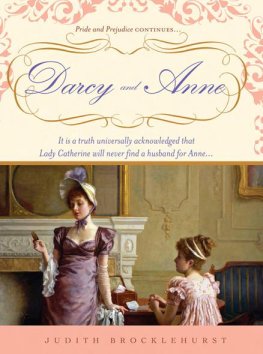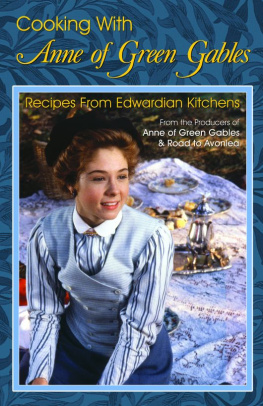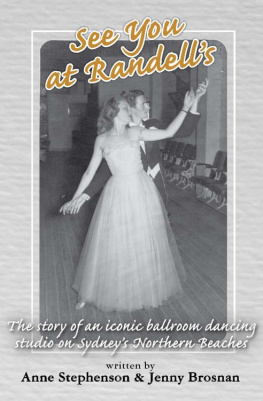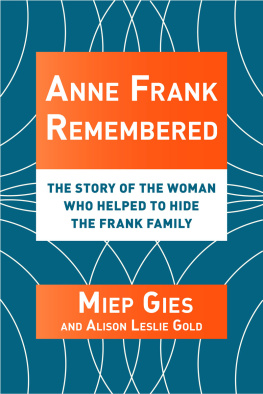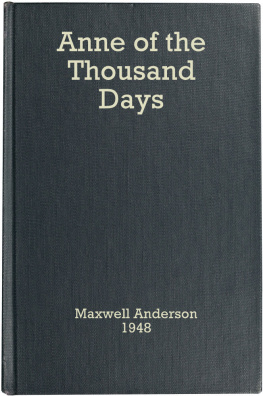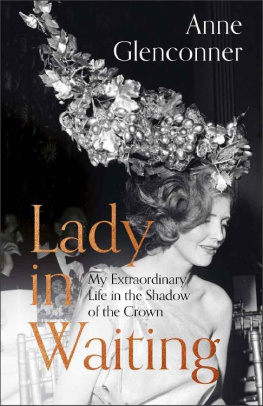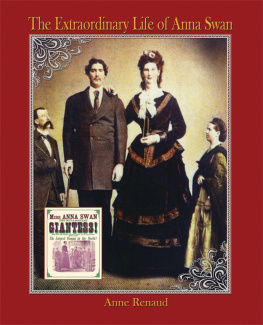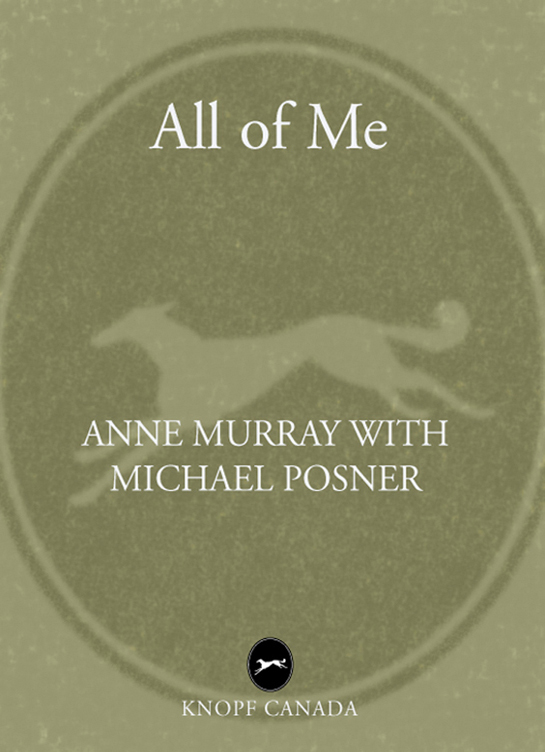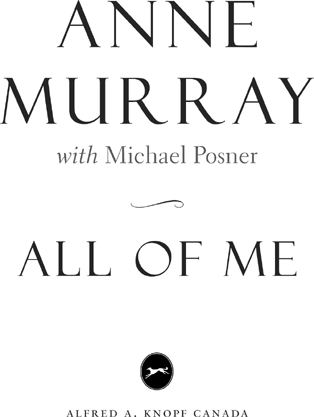
This book is dedicated to Leonard Rambeau,
whose faith in me never faltered.

CHAPTER ONE
M Y MOTHER HAD PRAYED FOR A LITTLE GIRL .
Every day during her fourth pregnancy, Marion Murray entreated Saint Anne, the mother of the Virgin Mary, to deliver a girl to join her three young sons. This was not an idle request. Mom took her prayersand her Catholicismvery seriously. She lit candles, said novenas and promised Saint Anne that if she were to be blessed with a girl, she would call her Anne. In the end, when I was delivered by Dr. Harold Simpson on the morning of June 20, 1945, at All Saints Hospital in Springhill, Nova Scotia, I was named Morna AnneMorna after my paternal grandmother. Morna came first because Morna Anne Murray flowed a lot better than Anne Morna Murraymy first lesson, perhaps, in the importance of rhythm. My mother had no doubt that it was prayer alone that had been responsible for my arrival. Such was her gratitude that virtually until the day she died, she stayed in touch with priests at the Sainte-Anne-de-Beaupr shrine in Quebec, sending regular donations.
With three older brothersDavid, Daniel and Haroldand later two younger onesStewart and Brucemy childhood fate was largely predetermined. I didnt have a chance. Even before I could walk they had laced a pair of boxing gloves onto my hands for a family photograph. I never actually donned them for a fight, but they are an apt metaphor. I was a tomboy and relished the role, wanting to do everything my brothers did, stubbornly resisting the repeated well-intentioned efforts of my mother to transform me into a model of junior femininity. I did have dolls and I did play with them, but they were never a major part of my childhood. Only years later, long after I had left home, did my mother succeed in decorating my bedroom as she had long envisaged it, with frilly pinks and whites replacing my posters of Hollywood heartthrob James Dean and Tony Dow (Leave It to Beavers older brother, Wally). I had it bad for Tony Dow.
Taught by my older brothers, I learned to catch, throw and hit a baseball with proficiency. Along with them I rooted for the Brooklyn Dodgers and the Toronto Maple Leafs, though my loyalties shifted from time to time to Dads favourite team, the Montreal Canadiens. The boys owned a vast baseball card collection that we stored in gallon ice-cream pails. In time I memorized the batting and earned-run averages of every major-league player. My brothers liked to quiz methey would cover up most of the card and, from the portion that remained visible, I had to identify the player and what team he played for and recite all his relevant numbers.
Outdoors I was recruited for neighbourhood games and, because I had a good arm, later played centre field for our girls softball team, the Top Hats. We won the town championship, but my contribution to our victory was minimal. Despite my training, I was never a confident player, either at bat or in the field. I rarely swung at pitches and in the field I was often thinking, Please, dont hit it to me.
I would never be able to compete seriously with my brothers on the sports field, and I knew it. This is just a theory, but its possible that when I discovered in my early teens that I could sing reasonably well, I worked hard at it precisely because it was one thing that I could do better than they could. I couldnt get enough of singing; it was a tonic for my otherwise deflated sense of self-esteem. But that was later. In my early years we were a sports-mad family. We swam, played baseball and hockey (Dad would rent the local skating rink for an hour on Sundays after church), and on Saturday nights during the winter and all through the Stanley Cup playoffs, watched hockey games religiously around the family TV. It was a nineteen-inch black-and-white Westinghouse with chrome legs that sat in my parents bedroom; all eight of us and assorted friends sprawled in awkward configurations on the bed or the floor to watch it. (In his later years, whenever the Canadiens were playing, Dad would don his official Guy Lafleur number ten jersey.)
They were an active bunch, my brothers; they loved to box and wrestle with each other, and often roughhoused with me as well. Until Harold went off to college, I dont think he ever missed an opportunity to slug me in the arm if I was within his considerable range. He was merciless with all of uson the day he left, Stewart, Bruce and I cheered lustily from the back porch of our big Main Street home. On my sixteenth birthday two of the older boys administered the traditional sixteen slaps to my butt with such enthusiasm that I was brought to tears. I would fight backwrithing, wriggling, flailing, screaming and complaining frequently to Mom, but usually without results. The precise circumstances of one incident are lost in the mists of memory, but Harold had pushed me a little too far, and in a moment of anger I picked up a small rock and hurled it at him, nicking his ear (I think I was eight or nine at the time). He put his hand to his ear, felt the blood trickling down and flashed me a big, wicked grinnot because he was proud of me for fighting back, but because he knew he would need a few stitches to sew it up. And, since I had drawn blood, he knew that some form of parental wrath would be expressed and that I, for once, would be its recipient. He was going to savour that moment.
Much of the time, Im sure, I was either a nuisance or a burden to my brothersor both. Once when I was an infant, the boys wheeled me down the street in my pram and left me while they went inside a store. One small problem: they had neglected to put on the brakeand Springhill is built on a cluster of steep hills. So down the hill I went, gathering speed, until an alert neighbour spotted the careening carriage and raced out to save me. But for that timely intervention, my music career might have been aborted very early. On another occasion, while I was still a toddler, I was again consigned to the less-than-scrupulous care of the older boys. They wanted to play baseball. These two imperativesplay and supervisionconflicted, so they cleverly arrived at a solution that would keep me from wandering off: they thoughtfully tied me to a nearby tree and the game continued. At other times I was a victim of their pranks. Walking home at night from movies at the community hall in Northport, where we spent our summers, they would run ahead and hide in ditches and behind trees, leaving me alone in complete darkness. Then theyd jump out and scare me half to death.
In turn, when I was charged with their care, I often regarded my younger brothers as an unwelcome responsibility. I was three years older than Stewart and six years older than Bruce, and I could be as inattentive as my older brothers had been. Once when I was ostensibly babysitting four-year-old Bruce, he decided he wanted to use the record player. To do so he had to move a lamp, which he laid down on a foam pillow, which then caught firewhile I was busy playing cards downstairs with a boyfriend. I smelled burning rubber and, Dad being at work and Mom out, my boyfriend ran to get his father. The local newspaper, the Record, reported the story of menacing Master Murray, the four-year-old arsonist, but no serious damage was done.
My brother Daniel was the family tease. He enjoyed pinning me to the floor, his knees firmly pressing down on my shoulders so that I was immobilized, and then threatening to lick my face, inching ever closer. He denies these accusations today, but his memory is clearly flawed. Daniel had other idiosyncratic methods of torture as well. With a doctor for a father and a nurse for a mother, their six germ-carrying kids were repeatedly instructed never to drink from each others glass or eat food the others might have touched. Daniel exploited these instructions ruthlessly. Typically Mom would have us all sit at the kitchen table while she rushed back and forth with plates of food. Even before wed finished the main course, shed set out the dessert as well. One of our favourites was date squares. Shed be fussing with something, her back turned, and Daniel, slowly and methodically, would take each square and carefully lick both sides, effectively claiming them as his own. After that we couldnt and wouldnt touch them. But, if we knew what was good for us, we also couldnt snitch on him to Mom. So Mom would ask, How come no one but Daniel is eating the squares? and we could say nothingDaniels withering glare warning us of dire consequences if we dared. That kitchen table, incidentally, contained a small drawer in which Bruce and I hid bread crusts, which we hated. Id been told they put hair on your chest, and I didnt want any part of that.


